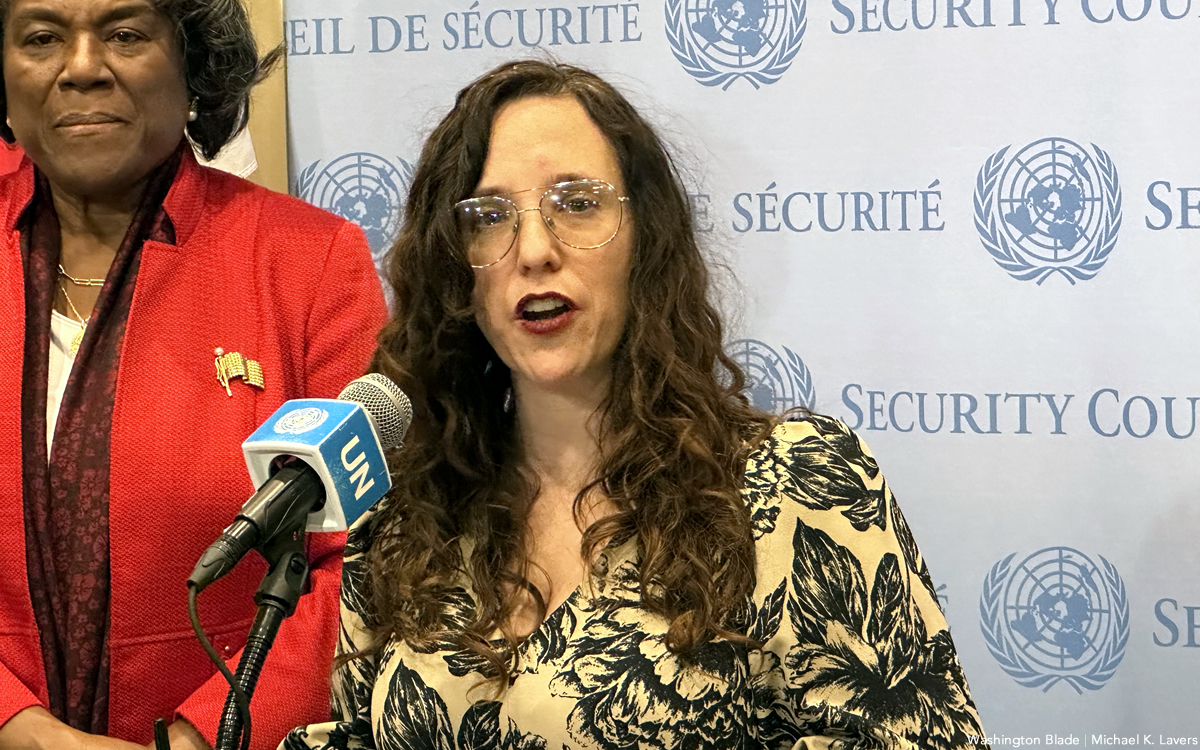United Nations
US global LGBTQ, intersex rights envoy participates in UN women’s conference
Jessica Stern traveled to N.Y. this week

Jessica Stern, the special U.S. envoy for the promotion of LGBTQ and intersex rights abroad, traveled to New York this week to participate in the 68th session of the Commission on the Status of Women at the U.N.
Stern arrived in New York on Tuesday and left on Friday.
The CSW68, the largest annual U.N. gathering on gender equality and women’s empowerment, began on Monday and will take place through March 22 under the theme of “accelerating the achievement of gender equality and the empowerment of all women and girls by addressing poverty and strengthening institutions and financing with a gender perspective.” This year’s session holds particular significance as global statistics reveal persistent gender disparities, with 10.3 percent of women living in extreme poverty and progress towards poverty eradication lagging significantly behind targets.
Accelerating progress towards gender equality necessitates substantial investment, with an estimated additional $360 billion per year needed to achieve key global goals. Stern while in New York sought to advocate for prioritizing policies and programs that address gender inequalities and enhance women’s agency and leadership, noting the transformative impact such investments could have on lifting millions out of poverty and spurring economic growth.
At CSW68, governments, civil society organizations, experts and activists will converge to discuss actions and investments aimed at ending women’s poverty and advancing gender equality.
Moreover, the CSW68 serves as a critical platform for sharing best practices and innovative approaches to addressing gender disparities. Stern participated in panel discussions and workshops, offered insights gleaned from her extensive experience in advocating for the rights of LGBTQ people and marginalized communities.
United Nations
UN Human Rights Council extends LGBTQ rights expert’s mandate
29 countries voted for resolution

The U.N. Human Rights Council on Monday extended the mandate of the United Nations’ independent LGBTQ rights expert for another three years.
The resolution passed with 29 countries (Albania, Belgium, Bolivia, Brazil, Bulgaria, Chile, Colombia, Costa Rica, Cuba, Cyprus, the Czech Republic, the Dominican Republic, France, Georgia, Germany, Iceland, Japan, Kenya, the Marshall Islands, Mexico, the Netherlands, North Macedonia, South Korea, Romania, South Africa, Spain, Switzerland, Thailand, and Vietnam) voting for it and 15 countries (Algeria, Bangladesh, Burundi, China, Cote d’Ivoire, Democratic Republic of Congo, Ethiopia, Gambia, Indonesia, Kuwait, Malawi, Maldives, Morocco, Qatar, and Sudan) voted against it.
Benin, Ghana, and Kyrgyzstan abstained.
The U.S. in February withdrew from the Human Rights Council. The Trump-Pence administration in 2018 pulled the U.S. from it. The U.S. in 2021 regained a seat on the Human Rights Council.
Graeme Reid has been the UN’s independent LGBTQ rights expert since 2023. The South African activist, among other things, previously ran Human Rights Watch’s LGBT Rights Program.
United Nations
Trump pulls Elise Stefanik’s UN ambassador nomination
Republicans have slim majority in US House of Representatives

President Donald Trump on Thursday withdrew U.S. Rep. Elise Stefanik (R-N.Y.)’s nomination to become the next U.S. ambassador to the U.N.
The Associated Press noted Trump in a Truth Social post said it was “essential to maintain every Republican seat in Congress.”
Republicans currently have a narrow 218-213 majority in the U.S. House of Representatives. Special elections to fill the seats that National Security Adviser Mike Waltz and former U.S. Rep. Matt Gaetz (R-Fla.) vacated when they joined the Trump-Vance administration and resigned respectively will take place on April 1 in Florida.
“Elise Stefanik is truly a great leader and a devoted patriot,” said House Speaker Mike Johnson (R-La.) in a statement. “Today’s selfless decision shows America what those of us who work with her already know. She is deeply devoted to her country and fully committed to see President Trump’s agenda succeed in Congress.”
“It is well known Republicans have a razor-thin House majority, and Elise’s agreement to withdraw her nomination will allow us to keep one of the toughest, most resolute members of our conference in place to help drive forward President Trump’s America First policies,” he added. “There is no doubt she would have served with distinction as our ambassador to the United Nations, but we are grateful for her willingness to sacrifice that position and remain in Congress to help us save the country.”
Stefanik, 40, has represented New York’s 21st Congressional District since 2015. She later became chair of the House Republican Conference.
Stefanik in 2019 voted for the Equality Act, but she opposed it in 2021. Stefanik in 2022 is among the dozens of Republicans who voted for the Respect for Marriage Act that then-President Joe Biden signed.
Stefanik, among other things, has also been outspoken against antisemitism on college campuses.
Trump has not said who he will nominate to become U.N. ambassador. Johnson in his statement said he will “invite her to return to the leadership table” of the House Republican Conference “immediately.”
United Nations
US withdraws from UN LGBTI Core Group
State Department: Decision ‘in line with the president’s recent executive orders’

The U.S. has withdrawn from a group of U.N. member states that have pledged to support LGBTQ and intersex rights.
The U.N. LGBTI Core Group formed in 2008.
Chile and the Netherlands are the current co-chairs. Albania, Argentina, Australia, Belgium, Bolivia, Brazil, Cabo Verde, Canada, Colombia, Costa Rica, Croatia, Denmark, the Dominican Republic, Ecuador, Finland, France, Germany, Honduras, Iceland, Ireland, Israel, Italy, Japan, Luxembourg, Malta, Mexico, Montenegro, Nepal, Peru, New Zealand, North Macedonia, Norway, Portugal, South Africa, Spain, Sweden, Timor Leste, the U.K., and Uruguay are members.
The EU, the U.N. High Commissioner for Human Rights, Human Rights Watch and Outright International are observers.
“The overarching goal of the UN LGBTI Core Group in New York is to work within the United Nations framework on ensuring universal respect for the human rights and fundamental freedoms for all, specifically lesbian, gay bisexual, transgender, and intersex (LGBTI) persons, with a particular focus on protection from violence and discrimination,” states the Core Group’s website.
The Core Group also has three specific objectives:
• Raising awareness about LGBTI issues
• Contributing to multilateral work and negotiations at the United Nations
• Seeking common ground and engaging in a spirit of open, respectful and constructive dialogue and cooperation with UN member states and other stakeholders outside the Core Group.
The promotion of LGBTQ and intersex rights were a cornerstone of the Biden-Harris administration’s foreign policy.
Former first lady Jill Biden last September spoke at a Core Group event that took place on the sidelines of the U.N. General Assembly. Former President Joe Biden was vice president in 2016 when he spoke at a Core Group event that coincided with that year’s U.N. General Assembly.
President Donald Trump since he took office on Jan. 20 has signed a number of executive orders that have targeted the LGBTQ and intersex community. These include the “Defending Women from Gender Ideology Extremism and Restoring Biological Truth to the Federal Government” directive that, among other things, bans the State Department from issuing passports with “X” gender markers.
A directive that Secretary of State Marco Rubio issued bans embassies and other U.S. diplomatic institutions from flying the Pride flag. (Joe Biden in March 2024 signed a government spending bill with a provision that banned Pride flags from flying over U.S. embassies.)
The Associated Press last week reported the Trump-Vance administration has terminated 90 percent of the U.S. Agency for International Development’s foreign aid contracts. Activists with whom the Washington Blade has spoken in previous weeks say the White House’s decision to freeze nearly all U.S. foreign aid spending has been “catastrophic” for the global LGBTQ and intersex rights movement.
A source told the Blade the U.S. withdrew from the Core Group on Feb. 14. A State Department spokesperson on Saturday confirmed the withdrawal, but did not specify the specific date.
“In line with the president’s recent executive orders, we have withdrawn from the U.N. LGBTI Core Group,” said the spokesperson.
-

 U.S. Supreme Court5 days ago
U.S. Supreme Court5 days agoSupreme Court to consider bans on trans athletes in school sports
-

 Sports5 days ago
Sports5 days agoTrans cyclist’s victory sparks outrage in conservative media
-

 Israel5 days ago
Israel5 days agoActivist recalls experience in Tel Aviv after Israel-Iran war began
-

 Congress5 days ago
Congress5 days agoCongress passes ‘Big, Beautiful Bill’ with massive cuts to health insurance coverage












